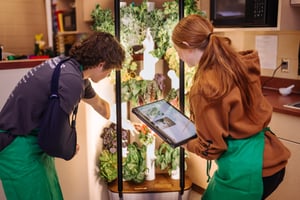April is National Garden Month, a time to celebrate the beauty, benefits, and joy of gardening. For...
Integrating Mindfulness and STEM with Gardyn in Classrooms
The Role of Mindfulness in Modern Education
In the fast-paced world of education, the inclusion of mindfulness practices has become increasingly essential. Mindfulness, the practice of maintaining a moment-by-moment awareness of our thoughts, feelings, bodily sensations, and surrounding environment, is a powerful tool in enhancing students' focus, emotional regulation, and overall mental well-being. As educators face the challenge of preparing students for the complexities of the modern world, integrating mindfulness into the curriculum has proven to be an effective strategy for promoting social-emotional learning and academic success.
Research suggests that mindfulness in education can lead to improved concentration, decreased anxiety, and better emotional management among students. These benefits are particularly crucial in today's classrooms, where students often face high levels of stress and distraction. By fostering a mindful learning environment, educators can help students develop the skills necessary for self-awareness and self-regulation, ultimately leading to greater academic achievement and personal growth.
Unveiling the Gardyn Mindfulness Lab
The Gardyn Mindfulness Lab offers an innovative approach to combining mindfulness with STEM education. By integrating hydroponic gardening with a structured mindfulness curriculum, Gardyn provides educators with a unique opportunity to engage students on multiple levels. This hands-on approach allows students to explore scientific concepts while simultaneously practicing mindfulness, leading to a deeper understanding of both subjects.
Gardyn's technology supports mindfulness practices by encouraging students to develop a connection with nature. As students engage with the hydroponic systems, they learn to observe and appreciate the growth processes, fostering a sense of wonder and curiosity. This integration of mindfulness and STEM not only enhances students' cognitive skills but also nurtures their emotional intelligence, preparing them to navigate the challenges of the future.
Hydroponics as a Tool for Inquiry-Based Learning
Hydroponic gardening, as implemented by Gardyn, serves as a powerful tool for promoting inquiry-based learning. This educational approach encourages students to ask questions, explore solutions, and engage in hands-on experimentation. By utilizing hydroponic systems, students can investigate scientific principles such as plant biology, nutrient cycles, and environmental sustainability in a practical and engaging manner.
The Gardyn Mindfulness Lab curriculum seamlessly integrates STEM subjects, allowing students to apply theoretical knowledge in a real-world context. Through project-based learning, students develop critical thinking and problem-solving skills, essential for success in the 21st century. This active learning process not only boosts student engagement but also fosters a lifelong love for learning and exploration.
Fostering Emotional Regulation Through Nature
Nature has long been recognized for its calming and restorative effects on the human psyche. By incorporating hydroponic gardening into the classroom, Gardyn provides students with a natural outlet for emotional regulation. The act of nurturing plants and observing their growth can instill a sense of responsibility and purpose, helping students manage their emotions and reduce stress.
The Gardyn Mindfulness Lab encourages students to engage with nature mindfully, promoting a deeper connection with the environment. This connection not only enhances students' emotional well-being but also cultivates a sense of environmental stewardship. As students learn to care for their hydroponic gardens, they develop empathy and compassion, traits that are invaluable in today's interconnected world.
Practical Strategies for Implementing Gardyn in Schools
Implementing Gardyn's innovative curriculum in schools requires careful planning and strategic execution. Educators can begin by familiarizing themselves with the Gardyn Mindfulness Lab resources, which include NGSS-aligned lesson plans, curriculum maps, and advancement activities. These materials provide a comprehensive framework for seamlessly integrating hydroponic gardening into existing curricula.
To ensure successful implementation, educators should consider the unique needs and interests of their students. Adapting the curriculum to suit the classroom environment and learning pace is crucial for maximizing student engagement and learning outcomes. Furthermore, leveraging the interactive Q&A sessions and implementation strategies offered by Gardyn can provide educators with valuable insights and practical tips for enhancing the learning experience.
Empowering Future Leaders with Mindfulness and STEM
The integration of mindfulness and STEM education through Gardyn's hydroponic technology is a transformative approach to nurturing the leaders of tomorrow. By equipping students with essential academic, social, and emotional skills, this innovative curriculum prepares them for the complexities of the modern world. As students engage in mindful learning experiences, they develop critical thinking, creativity, and leadership skills, empowering them to make informed decisions and contribute positively to society.
Gardyn's commitment to fostering community engagement and resource optimization further enhances the impact of this educational approach. By collaborating with educators, school administrators, and curriculum specialists, Gardyn ensures that its programs address educational, economic, and mental health challenges, creating a holistic and inclusive learning environment for all students. Through the power of mindfulness and STEM, Gardyn is shaping the future of education, one classroom at a time.


